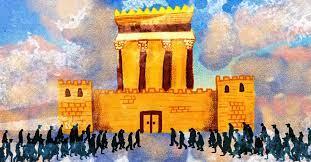The Mitzvot of the Offerings
1:1 to 7:38
At the start of Leviticus, we are immediately confronted by detailed and graphic mitzvot concerning animal sacrifices which for some, could be very offensive. Without hesitation, the book explains how the offender should slaughter the animal, how he should skin it and cut it into pieces. But what are we to discover behind this first, uninviting, aggressive description of the sacrifices and the overwhelming amount of blood? The moment we discover that Leviticus is not really a book, but a mirror, one will begin to grasp its message. YHVH is holy and He requires our purity. What is most offensive here is not the animal sacrifice . . . but our actions, our sins which have caused our separation from Him. And the wages of sin is death, but the free gift of God is eternal life in Messiah Yeshua our Lord (Romans 6:23). Leviticus demands that we evaluate the causes and consequences of our own sins and then draw closer to God. We need to understand that Leviticus is much more than these sacrifices and offerings, for behind them stands our Messiah with open arms.16
The Torah is filled with various mitzvot of one kind or another. The term mitzvot is a general term used to refer to any commandment given by ADONAI. Mitzvot can be further divided into the subcategories of statues and ordinances. Leviticus preserves the balance between obedience to God’s statues (Hebrew: hachukkim, meaning to write into law permanently) and ordinances (Hebrew: ham mishpatim, meaning a judgment of the court).
It is also important to understand that there was no permanent atonement for sin in the Dispensation of Torah (see the commentary on Exodus, to see link click Da – The Dispensation of Torah), only a temporary covering offered in faith. In Psalm 32:1, David said: How blessed are those whose offense is forgiven, those whose sin is covered. A sacrifice offered while just going through the motions was not accepted by ADONAI, just like going through the motions of going to church would be today (sitting in the garage doesn’t make you a car; therefore, sitting in a place of worship, doesn’t make you a believer).

And there was no offering for intentional sin. For it is impossible for the blood of bulls and goats to take away sins (Hebrews 10:4). If Ha’Shem had allowed a sacrifice for intentional sin, this would be the same as giving permission to sin. The implication would be that the sin offering was a penalty for the sin. In that case, one could sin abundantly, knowing full well that it would be covered by offering a goat the next day. Kind of like a Catholic confession. Say a few hail Mary’s and you’re ok. But the burnt offering is not a penalty for sin either, be it intentional or unintentional. The only recourse the Torah commands for intentional sin is the same that the Master commands to us – repentance.



Leave A Comment